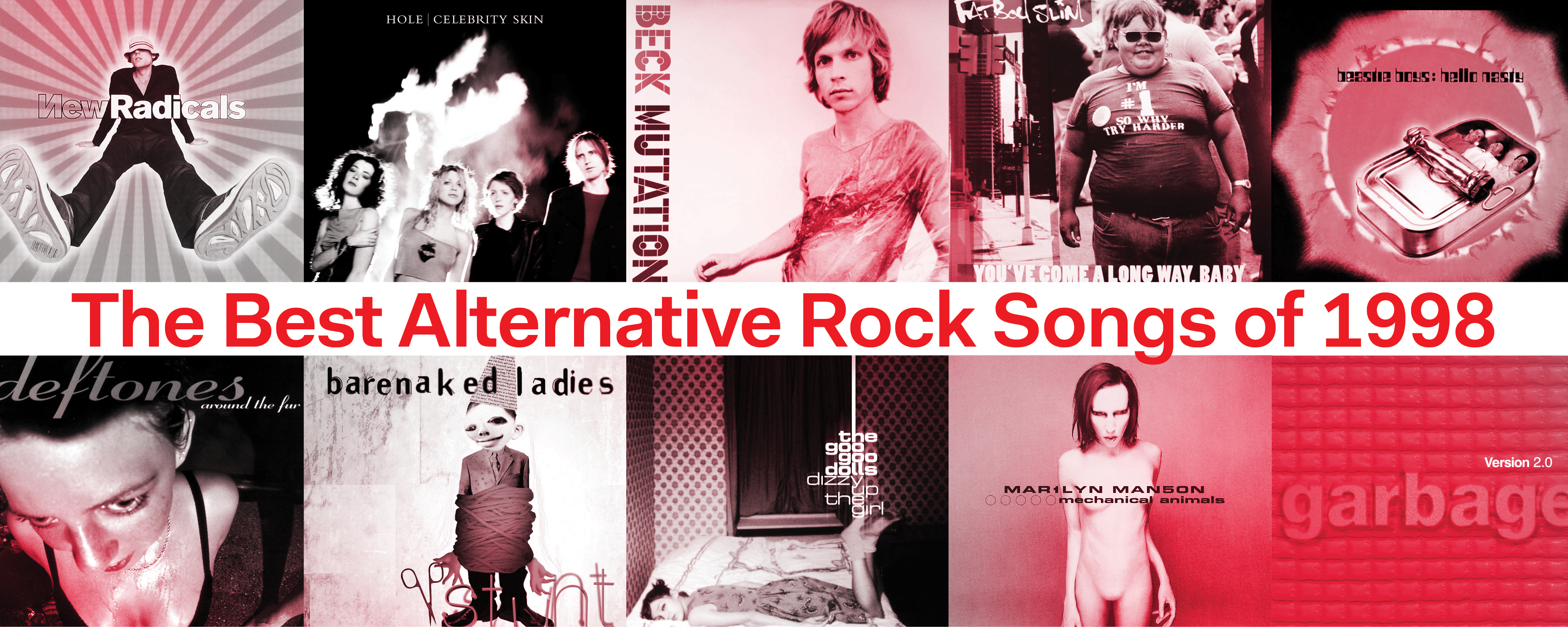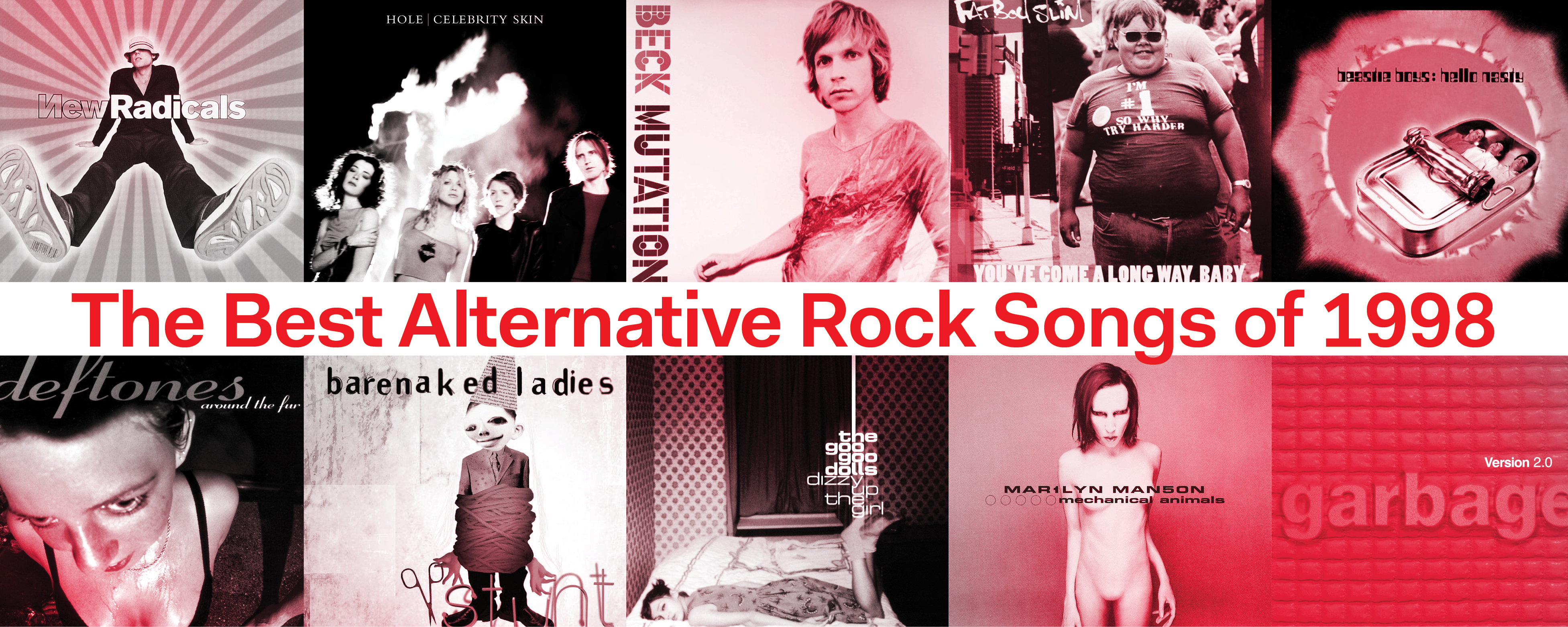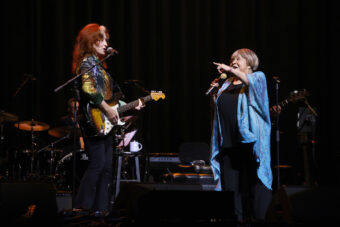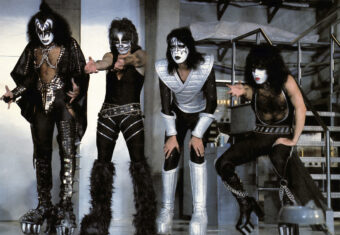29. David Bowie – “I’m Afraid of Americans”
Pop culture in 1995: David Bowie’s newest collaboration with Brian Eno narrowly dodged a Keanu Reeves movie and instead debuted on the soundtrack to Showgirls, right next to Killing Joke and No Doubt. Two years later, Bowie revived “I’m Afraid of Americans” for the album Earthling, but the version that clawed its way onto American radio the next year was a seething remix by his tour openers, Nine Inch Nails. Bowie—a lifetime early adopter, releasing downloadable music in the age of dial-up—went straight to the source of the distorted, digitally mediated industrial sound, and built it around his most paranoid yet quotable hook: “I’m afraid of Americans / I’m afraid of the world.” Years earlier, he’d lamented the country’s tragicomedy in “Young Americans,” his tribute to funk and a kind of love letter to Soul Train. In the era of his frosted tips, Bowie picked up a more ambient disillusionment with capitalism, the sinister chirps of surveillance culture, the grimly foreshadowing image of a trenchcoated Trent Reznor pursuing him through Manhattan. I’m afraid of Americans too. —AG
28. The Flys – “Got You (Where I Want You)”
Like most of the fluke alt-rock hits on this list, “Got You (Where I Want You)” was the answer to a question nobody would’ve ever asked. In this case: What if the brotherly scions of third-wave emo were from “the first family of surfing” instead of the Kinsella household? About 85 percent of the sound and sentiment of “Got You (Where I Want You)” could’ve emerged from any VFW hall in suburban Chicago. The twist comes from the other 15: a rap-reggae breakdown that’s straight out of Pacific Sunwear. The Flys’ Adam Paskowitz reportedly taught Sublime’s Bradley Nowell how to surf. By the sound of “Got You (Where I Want You),” Bradley taught him a few things, too. —IC

Also Read
The Year in 1998 Alternative Rock
27. Pulp – “A Little Soul”
The third single from Pulp’s final album This Is Hardcore, “A Little Soul” is an ode from an absentee father to his young son. Its lyrics (“I wish I could be an example / Wish I could say I stood up for you / And fought for what was right / But I never did,I just wore my trenchcoat and stayed out every single night”) could easily be interpreted as a reference to frontman Jarvis Cocker’s own father, an actor and DJ who Cocker says abandoned his family when he was seven. The element of desperate, self-loathing hope from the song’s narrator (“But please don’t turn out like me, you look like me/But you’re not like me I know”) scans as both forgiveness from Cocker and as a sort of pity for his long-gone father. It’s one of Pulp’s best singles, if not one of their best known. —TB
26. Hole – “Malibu”
On first listen, the second single from Hole’s Celebrity Skin is sodden beside the magnificently bilous title track. Like “Celebrity Skin,” it was cowritten by Billy Corgan and Hole’s Courtney Love and Eric Erlandson. Was this the best they could come up with? Radio did wonders for “Malibu,” though. Produced to mimic the poisonous violet sheen of Carter-era FM hits by Kenny Loggins and various members of the Eagles, “Malibu” is all predictable chord patterns played on sun-kissed acoustic guitars until Courtney Love intentionally fucks it up, intimating doom in her wobbly voice. “How’d you get so desperate/How’d you stay alive,” she wonders. The questions linger for longer than you might initially expect. —AS
25. Elliott Smith – “Waltz, No. 2 (XO)”
The de facto title track of 1998’s XO, “Waltz, No. 2 (XO)” is a marquee Elliott Smith song. Its familiar waltz tempo and hushed chorus feel silken and intimate; Smith’s newly elaborate and layered arrangements give it heft and grandeur. But—to state the obvious—Elliott Smith songs don’t belong on marquees. Generally interpreted as a response to his mother’s remarriage and a troubled, allegedly abusive relationship with his stepfather, “Waltz” is crushingly, soul-scraping sad. It recounts a karaoke battle between the unhappy couple, a seething exercise in secondhand passive aggression that plays out in real time as the narrator looks on in anguish. “I’m going to love you anyway,” Smith promises, but his words tumble into a void, a yawning space between people that no amount of lush instrumentation can fill. —AG
24. U2 – “The Sweetest Thing”
“The Sweetest Thing” had a circuitous route to pop success. First recorded and released eleven years before it charted in ‘98, the song began life as a charming B-side to “Where the Streets Have No Name.” It’s easy to see why U2 left it off The Joshua Tree: With an unplanned-sounding dub breakdown and openly lovey-dovey lyrics that Bono wrote as an apology to his wife for spending her birthday in the studio, it would have made a goofy counterpart to that album’s messianic grandeur. But when the band dusted it off and rerecorded it for the greatest hits compilation The Best of 1980–1990, they’d recently been moving away from stadium-sized guitar music toward an attempt at cosmopolitan electronic pop, and suddenly a lighthearted blue-eyed soul song like this one didn’t seem so out of place. (The new version lost the dub breakdown, sadly.) “The Sweetest Thing” is enjoyable precisely because it doesn’t have any pretensions about being larger or more important than it is. It’s a testament to the power of letting loose and having fun, a lesson U2 has unfortunately spent the last decade forgetting. —AC
23. The Offspring – “Pretty Fly (For a White Guy)”
The Offspring made the inevitable jump to a major label after 1994’s Smash became the best-selling indie rock record of all time. Ixnay on the Hombre, the follow-up, made the mistake of assuming that the millions of fans who yah-yahed along to “Self Esteem” cared about punk credibility as they did. But on fifth album Americana, Dexter Holland showed that he may be dumb, but he’s not a dweeb: “Pretty Fly (For a White Guy)” initiated the career-saving pivot toward poppy-but-still-snotty sounds that resulted in “Why Don’t You Get a Job,” “She’s Got Issues” and “American Prankster.” In the most “1998” twist of all, the band wanted Seth Green to play the “white guy” in the video, but he was too busy to take the job. —IC
22. Smashing Pumpkins – “Ava Adore”
When did you first realize Billy Corgan was weird as hell? For many of us who’d bought into the cartoonish sanctimony of “Zero” and “Bullet With Butterfly Wings,” that moment came on “Ava Adore,” the lead single from Smashing Pumpkins’ electronic-rock left turn Adore. “It’s you that I adore/You will always be my whore” should’ve been the first clue that Corgan would one day become the kind of guy who compares “social justice warriors” to the KKK. Then there was the video, which found him doing his best Nosferatu imitation as D’Arcy and James Iha writhed uncomfortably at his side. The thing is, that weirdness worked. “Weeeee must never be apart” sounded more romantic than creepy. The big, twitchy beats and laser-beam synths that were so trendy in the late ‘90s meshed seamlessly with the band’s chiming guitars. And in a year when many releases in the same sonic vein came off as calculated, this dark, textured new phase of the Pumpkins’ career actually felt like an evolution. —JB
21. Placebo – “Pure Morning”
Who can account for the effect of seeing Brian Molko in the music video for “Pure Morning” for the first time? All I know is that when I did something in my head seemed to come loose. What I had considered relatively solid ideas of gender had melted back into irregular preverbal shapes. It was a lot. To see Molko, perched at the edge of a tall building to the horror and fascination of observers below, his appearance flowing borderlessly between masculine and feminine, “When the Levee Breaks”-esque drums unfolding around him in menacing loops? I thought, “I want to be that.” —BN




